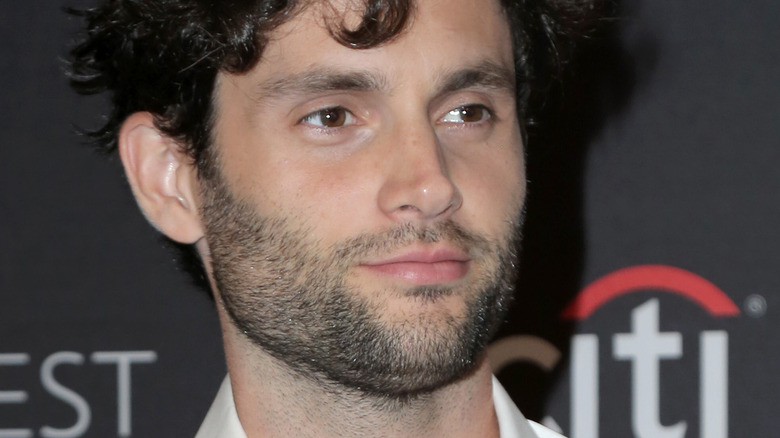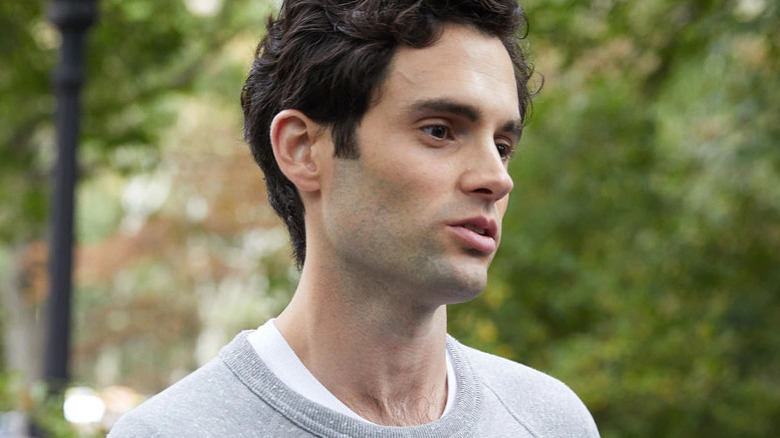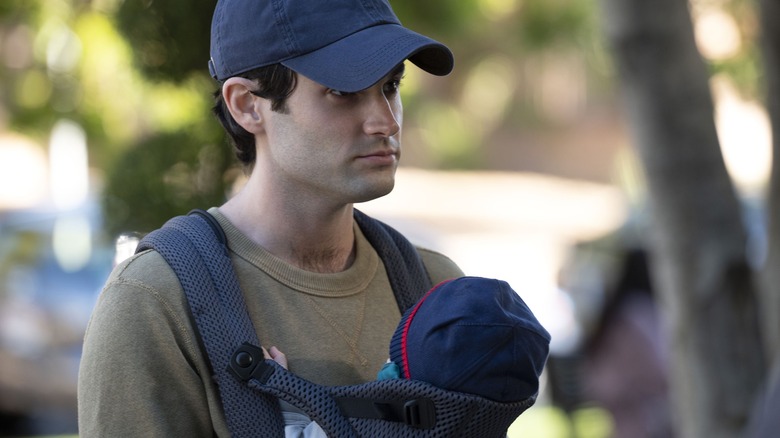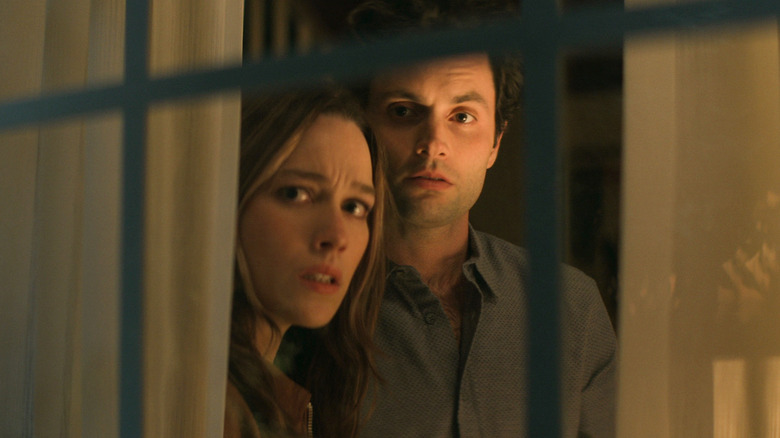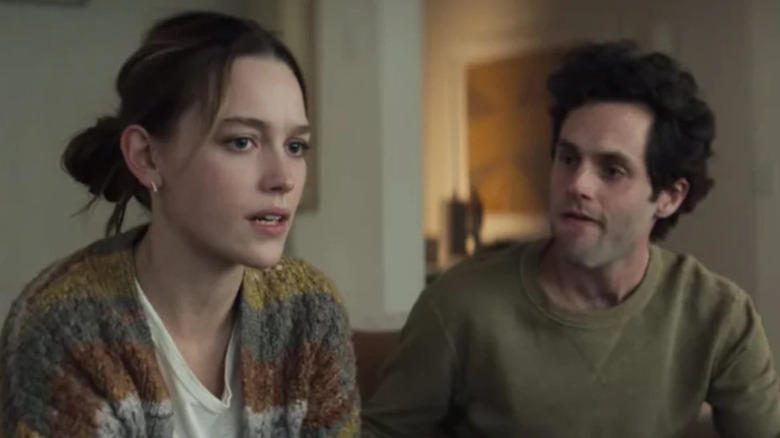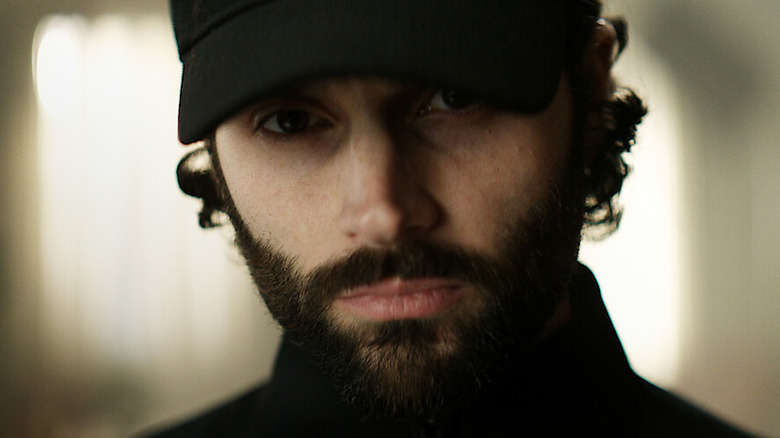The Messed-Up Part Of You That Fans Are Happy To Ignore
"You," a popular Netflix original horror thriller starring Penn Badgley as Joe, is coming back for Season 4. While "You" is a fun series with a lot of uniquity in narrative storytelling, it's a disturbing show. It's told from the perspective of Joe, a romantic who becomes so obsessed over his current love interest, it leads him to do horrible things, not just to her, but also to the people around her. Anything from stalking to kidnapping to murder is on the table, and the show works out the logic and reasoning behind his every evil deed.
So yes, Joe is a murderer and a stalker, but the show is deliberately told from his perspective. It sort of has a similar effect to the first few minutes of John Carpenter's original "Halloween," where the audience was put in the killer's POV. "Halloween" starts with a sequence of a young Michael Myers killing his sister, but the audience doesn't know that because they're in first-person perspective, as if they're killing the teenage girl themselves.
In "You," it's more than just a visual perspective. The audience is fed every thought Joe ever has. There are points where his logic is so sound, fans are deliberately cultivated to agree with his decisions and even cheer him on, though the same traits in other characters are condemned. While this is the point of the series, some viewers are uncomfortable with it.
One viewer started a Reddit discussion about the romanticization of Joe
Redditor u/FlipperKoala101 posted a discussion titled, "The amount of girls romanticising Penn Badgley's character in YOU actually scares me." They followed up their topic with an inquiry, "Since when have we started justifying violence and galore to win love?"
This simple topic discussion brought about an important realization, not just with "You," but with media in general. With the rise of obsession with serial killers and documentaries being pumped out about some of the most infamous serial killers of all time, it shouldn't be surprising that Joe ended up with many fans, especially women. U/cryogenicsleep responded to the original question posed by stating matter-of-factly, "Probably since the dawn of time."
U/Darttel pointed out the similarities to the serial killer obsession by saying, "It's kind of like the Ted Bundy effect? I remember the news reporting on all the women who swooned over him, sent lots of love letters, support ... for a kidnapping rapist necrophiliac."
If you or anyone you know is in need of help, please call the National Sexual Assault Hotline by calling 1-800-273-TALK (8255).
Some fans felt the need to defend why they liked Joe
The topic was a valid commentary on the show, but it did feel pointed. People who liked Joe and even rooted for him felt the need to explain their reasoning for doing so. U/FlipperKoala101 remarked, "It's interesting how they're blending his two faces together. One is all kind and caring while the other ugly and ruthless. All while maintaining his ultimate persona of being an intellectual who knows how to get into someone's head."
This points out why people could be fascinated and even charmed by a character like Joe. It's the same reason Hannibal Lecter from "The Silence of the Lambs" resonates so well with everyone despite being a murderous cannibal. There are multiple facets to these characters that make them relatable people in between the atrocities they commit.
Discover probably said it best in an op-ed about the viewing public's fascination with serial killers. "Audiences might be attracted to serial killer stories, but they typically don't admire the murderer," the outlet pointed out. "Serial killers aren't seen as antiheroes whose motives or actions are supported by the audience. Instead, serial killers are meant for audiences to revile. In this sense, we love to hate them – but how we love to hate serial killers changes with our cultural anxieties."
The fascination with serial killers can, in part, stem from "would culture," which is the tendency to study the trauma of others due to common fears. "The audience's fascination is less about the monster in question and more about why we fear the monster," Discover wrote.
Others said that was the whole point
U/stonedcoldathens made a compelling post about why the show is framed the way it is by saying, "I think that's kind of the point of the show and the book, right? That we've for some reason culturally romanticized possessive and obsessive behavior in men, while simultaneously condemning it (rightfully so) in women. Like with the Joe vs. Peach parallel. It seemed to me to be a social commentary on how we encourage toxic behavior in men."
This is part of the motivation for creating "You." U/stonedcoldathens pointed out the Joe vs. Peach (Shay Mitchell) parallel, but the show draws beyond that. His eventual wife, Love, becomes the object of his obsession in Season 2, but it's revealed that she's just as unhinged as Joe. Joe condemns her for behavior that's similar to his own. The show frames her to look worse than Joe despite them being one and the same. Fans loved Joe but hated Love, and it proved the Redditor's point about toxic masculinity and that men are given passes for bad behavior where women are not. In turn, women have been taught to accept these toxic traits as normal over time.
Series co-creator Sera Gamble told Cosmopolitan UK, "Penn has no red flags–If an actor walked into the casting room and creeped us out, they would have been completely wrong for this character. There are parts of Joe that are good, which Penn portrays, but these parts are at war with his desire to control those around him. The 'nice guy' is so much more terrifying than the bad boy."
The series played on the "nice guy" trope being a toxic ideal, and they did so flawlessly, to the point that some fans are obsessed with Joe.
One fan pointed out that this type of storytelling is relatively new
Although "You" stars Penn Badgley's Joe as the main character and the protagonist of his own story, Joe isn't actually a good person or a hero. The traditional storytelling narrative is to follow the hero's journey, meaning that when ingesting media, you're consuming something based on a hero, a good person, or an ordinary person ascending to greatness.
Villains and anti-heroes are usually supporting characters in someone else's story. That's how it's always been, but in recent years, it's become more common to put these characters into the main role. Shining the spotlight on characters who wouldn't traditionally be protagonists makes for interesting and compelling stories, but it hasn't settled well with everyone.
Another commenter wrote, "It's funny when I was growing up there were no cable shows about anti-heroes/villains in the main role. When there was a bad guy in a show fans would always root for them to go down. Over the past 15 years that has kind of shifted with the introduction of shows like Sopranos, Breaking Bad, and Dexter."
There's been a shift in storytelling where the media is more willing to tell the supposed bad guys' side of the story. By making them protagonists and making their motivations understandable and easily able to be rooted for, it gets rid of the black-and-white narrative that people are either entirely good or wholly bad.
It's okay to like Joe, though
It should be made clear that "You" is meant to be disturbing. As a viewer, you are supposed to be unsettled by Joe, but the narrative of also making you root for him is a deliberate cultivation to reflect on real-life obsessions. It should also be stated that "You" is fictitious, so there's nothing wrong with enjoying Joe's character. Anyone can like and even root for a character without condoning the character's actions.
In recent years, it's become popular for people to go after one another for the types of media and characters they enjoy, but the reality is, fiction has always dealt with problematic content. Fiction will always deal with conflict and people will always gravitate towards exploring dangerous situations and people in fiction because it's a safe place to explore and understand these things to a certain degree.
Joe isn't a good person, but he is a likable character and that's part of what makes "You" work. No one had an issue liking villains when they were just black-and-white villains. Everyone has a favorite Disney villain or rooted for a Marvel anti-hero that maybe wasn't the best person but also didn't deserve the hand they were dealt. Enjoying the characters as they're shifted to the main role isn't wrong. You're meant to like them even while they're doing horrible things. Enjoying a character — no matter whether they're good or bad – is perfectly fine.
